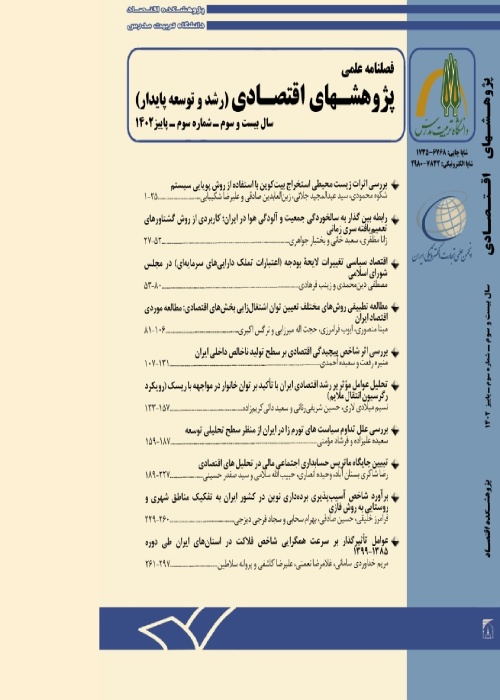Investigating the Effect of Human Development, Political Development and Civil Liberties Indicators on Environmental Quality
In recent decades, the environment has become one of the most important concerns of societies and governments. Achieving economic growth and development is costly and leads to an increase in the consumption of ecological capital. The efforts of countries to increase per capita income and prosperity, if not accompanied by environmental considerations, will bring irreversible losses, including rapid climate change and environmental destruction. Thus, comprehensive investigation and determination of economic and non-economic effective factors on the environment is of particular importance, to the extent that it has forced governments to adopt short- and long-term policies and programs to protect the environment.The existing economic literature on the Environmental Kuznets Curve (EKC) hypothesis indicates that at a threshold level of per capita income, countries reach a level of development where environmental improvements are achieved, but these studies have a serious flaw. Because they only focus on GDP per capita as a key variable to achieve environmental improvements and ignore the social dimension which is considered the pillar of sustainable development. Since the human development index includes the simultaneous description of social development and economic development, therefore, in this research, the Human Development Index is used instead of GDP per capita to investigate the Environmental Kuznets Curve (EKC) hypothesis and the relationship between HDI and the quality of the environment. Furthermore, political institutions can have a long-term direct impact on the environment and its sustainability. Therefore, investigating whether the indicators of human development, political and civil liberties can affect the quality of the environment, can be important.
In the present study, the effects of human development, political and civil liberties indicators on the environmental performance index (Ecological Footprint) in developing countries and developed countries are investigated using the System Generalized Method of Moments method (GMM-SYS). Then the Environmental Kuznets Curve hypothesis is investigated in selected countries. Likely, a country that has benefited from more ecological capital for its needs in the past will be more prone to environmental destruction and use of ecological resources in the future. Therefore, it is necessary to investigate the impact of the variable interruption of the ecological footprint on its value in the current year. Accordingly, in this research, the method of the System generalized moments is used, which helps to solve the possible problems of endogeneity caused by the existence of an interval of the ecological footprint variable as an independent variable by using instrumental variables.
The Generalized Moments' estimator is used in cases where the independent variables of the model are not completely exogenous. This estimator controls for the endogeneity problem by using instruments from the intercept of the dependent variable or the intercept of any other endogenous variable that is assumed to be uncorrelated with the fixed effects. The validity of the tools used in the model can be measured using the j-Hansen (1982) and Arellano and Bond AR (2) tests.
The results of the research indicate that the Human Development Index in selected developing and developed countries has a significant and negative effect on the ecological footprint, and a higher human development index is useful for improving the quality of the environment and reduces of pollutant emissions. Therefore, when the level of income, education, and health services in a country improves, the awareness of the importance of a safe and quality environment will increase. Similarly, according to the results of the Kuznets hypothesis, the relationship between the Human Development Index and the ecological footprint in the studied countries, confirms the hypothesis of Kuznets and the inverted U.The index of political development and civil liberties has a negative and significant effect on the ecological footprint in both developing and developed countries. It seems that the increase in civil liberties, higher democracy, and improvement of political rights will reduce the damage to the environment.The results suggest that with the increase in the consumption of fossil fuels, more pollutants are released into the environment, which leads to the destruction of the environment and harming it. Based on the results of the research, it can be said that trade liberalization and active international trade allow the transfer of newer technologies to developing countries that produce fewer pollutants. In addition, increasing urbanization in developing countries has a negative impact on the quality of the environment, but countries that focus more on economic development and scale can improve the quality of the environment by promoting the use of advanced technologies in parallel with urbanization.
The findings of the research indicate that policymakers are more likely to achieve sustainable economic development by improving the level of the human development index. Therefore, providing education and a health care system for all members of society can lead to the reduction of environmental degradation through the improvement of the human development index; Thus, increasing democracy, clarifying laws and regulations, freedom of assembly, freedom of the media and awareness can control corruption and prevent the personal use of natural and environmental resources by officials and powerful people.Policies such as pollution tax, green tax, development of energy-saving vehicles, and replacing them with worn-out vehicles can reduce energy consumption and reduce the emission of pollutants in the environment. Furthermore, increasing the degree of trade openness allows the entry of advanced and improved technologies that produce less pollution. Therefore, policymakers in developing countries are advised to import clean and renewable energy technologies to their country by increasing active international trade.
- حق عضویت دریافتی صرف حمایت از نشریات عضو و نگهداری، تکمیل و توسعه مگیران میشود.
- پرداخت حق اشتراک و دانلود مقالات اجازه بازنشر آن در سایر رسانههای چاپی و دیجیتال را به کاربر نمیدهد.


